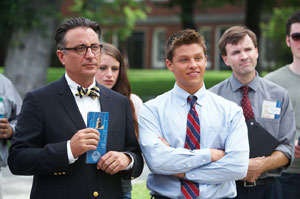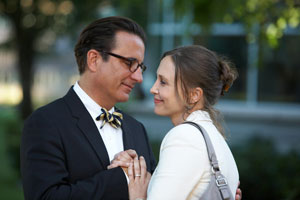The Art and the Craft
Casino Player sits down with celebrated actor Andy Garcia
by Tim Wassberg
Known for emotionally intense performances from his beginnings in “The Untouchables” to “Internal Affairs” to “The Godfather Part III” and the “Oceans” series, Andy Garcia always brings a degree of vigor to his work. With “At Middleton”, he explores the psychology and vulnerability of a man trapped against his own impulses after sharing an intense day with an alluring woman. Garcia talked to Casino Player about insight, exploration and the notion of possibilities.

Casino Player: How does experience make a great performer?
Andy Garcia: Your experiences are what you bring to every part. There are times when somebody says, “You’re going to make a great leader but you’re not ready yet.” Certain parts have a certain demand that you haven’t had a chance to live yet. People mature as actors as they get older. They grow. I know personally when I had children, I immediately became a better actor. Something happens to you spiritually. It is something that they teach you and the stakes grow.
CP: How much do you want to let the audience in versus what you want to keep a mystery?
AG: Just because you are sharing very private things in public doesn’t necessarily mean that they are still not private. We are witnessing, in any performance, people sharing very private elements of themselves. We don’t know what they are manifesting of themselves within the character or if they are being fueled by their life experience.
CP: Where does a sense of texture within a performance begin for you?
AG: I think having a sense of truth in the work is essential whether it is drama or comedy. It needs to have a resonance. The funniest things you’ve experienced in life or on the screen always have something at their core where, as you’re laughing, you’re shaking your head saying, “That’s exactly the way it is”. That kind of reflection sheds light and provides an insight into something that is sort of crystalline. You, as an actor, always try to be grounded in that. Sandy Meisner, the great acting teacher, would say “there is truth within imaginary circumstances”. And if you really empower that statement, that is basically what acting is.
 CP: What began your fascination with cinema?
CP: What began your fascination with cinema?
AG: I was exposed to American films being distributed in the local theaters [in Miami] when I was 11. Naturally I gravitated to movies… the ones I was allowed to see… that were more in the action adventure genre. I remember very specific performances by James Coburn in “The Magnificent Seven” and “In Like Flint”, Sean Connery as James Bond, Steve McQueen in “The Great Escape” and Burt Lancaster in “The Crimson Pirate”. These are the kind of the first fantastic experiences I had in cinema. Obviously, as I got older, it got more diverse. Peter Sellers. I was big fan of his work. I think his performance in “Being There” is one of the most extraordinary performances in the history of cinema. And certainly one of the greatest movies ever made from my perspective. Later, as I got older and more exploratory as I was getting into acting, it was more about “Mean Streets”, “Taxi Driver”, “The Godfather” and ‘Godfather II”. It was another generation and a new feeling.
CP: How do you know when you’ve attained an understanding of your possibilities?
AG: I think it is an innate sensibility or understanding that every individual has that can be nurtured. You have to have a certain desire for the art form for it to be able to be polished. It’s a feeling. [For example], not everybody can play professional baseball. You might be able to throw the ball but that doesn’t necessarily mean you have a good arm or can throw accurately. You have to understand when to throw it or not to throw it. You can have a natural ability but it has to be cultivated with serious study and time for it to flourish. You can’t just start. There are people that can walk into it and just do it. That’s fine. But other people need time to get to that point of relaxation, that understanding.
CP: By extension, what made this interaction between this man and woman within “At Middleton” so integral for you?
AG: They have a very intense day of life. They are living in an exploratory world. At one point my character gets sucked into the vortex of this woman and he has to follow it. Whatever she asks him to do, he does it. When they hit an acting class [within the movie], she is like “Do you want to play this game?” and he’s like “OK. I’ll play this game with you”. She gets sucked into his truth and they find themselves looking at each other going “Uh-oh”. They experience this thunderbolt, of having this very intimate experience and then deciding what to do about it.
CP: The very notion of chemistry…
AG: The great acting teaching Sandy Meisner always said “You have to take the performance from out of the person in front of you”. Then you have to release yourself to it and be in it. That’s the art. The craft is when inspiration is attached to it.
CP: Is there an art to the essence of poker from your perspective?
AG: I’ve played it. But I haven’t been overly stimulated by the game. I can see in the aspect of the poker face: Of that which you don’t want to reveal. You can also play someone totally the opposite who reveals everything.
CP: Is that how you saw your character in “Oceans”?
AG: With Terry Benedict in “Oceans”, I was thinking of a Mako shark.
CP: So the inference of an animal portrayal can dictate an action or a personification of character?
AG: You always have to have a vision stimulus: how does he look, how does he walk, how does he move? Is he languid? Is he sharp? All these things build the character. It is not only the instincts or behavior of the character; it’s about what part of his body he leads with. What kind of shoes does he wear? Everything you wear, at least for me, is very meticulous. You can’t just show up, put it on and be the guy.


